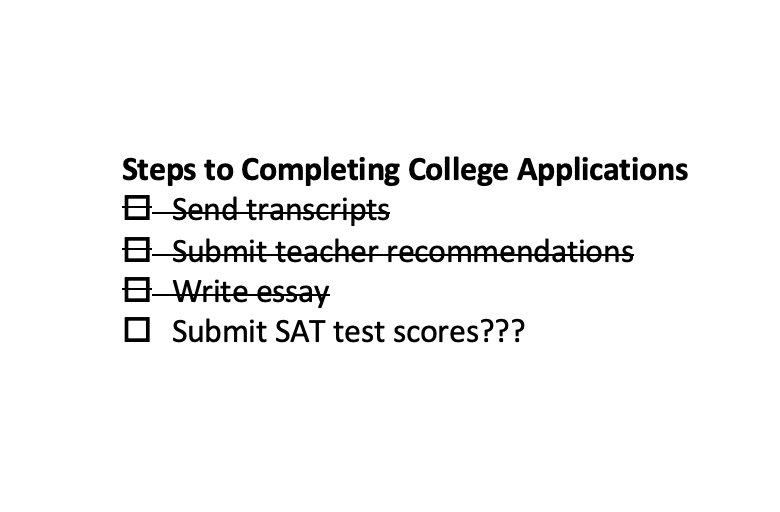Optional SAT Submissions
Why More Colleges Should Go Test Optional
Imagine a world where students are not defined by their test scores, one where students do not have to worry about test anxiety, one where students are valued for who they are as a whole rather than a simple piece of data. This is the world for students who apply to colleges known as “test optional.”
A test optional college or university means that student applicants are not required to submit test scores as part of their application. This is not the same as test “flexible schools,” which allow students to submit tests other than the SAT or ACT, such as AP exams.
Colleges that do implement this test optional stance implement an approach known as “holistic,” looking at the student as a whole. While GPA and scores submitted will go into the decision, these will not be the determining factors. The holistic approach equally ways recommendations, extracurriculars, work experience, GPA, background, among many other qualifications.
Recently, more colleges have gone test optional because of the belief that an SAT or ACT score will not accurately predict the college readiness of a candidate.
“Tests shouldn’t be the determining factor for a kid’s future and capacity in higher education,” says Senior Jacob Ethridge. Ethridge says he wishes there were more test optional schools for when he was completing college applications earlier this school year.
Some students are not good test takers, or have test anxiety when it comes to testing.
Test anxiety stems from the pressures of test taking and can cause students to perform lower than their actual ability. In extreme cases, students can also have panic attacks. Such severe pressure stems from the weight our culture places on these tests–establishing the conception that a student’s entire future is based off of one single test.
Students can take the SAT five times and not score higher than a 1300, not because they are not smart, but because they have test anxiety.
“Some kids are really bright and have a lot to contribute, but they may either be lacking in their study habits or might have test anxiety,” Ethridge iterates. “As a result of this, they might not do as well as others.”
As well as test anxiety, colleges believe that an SAT score requirement may lend itself to a less diverse student body.
Students in AP or honors classes can sometimes have the advantage over other students when it comes to testing. Students who take advantage of the higher level courses are often exposed to test structures that are similar to that of the SAT or ACT. A student in a regular level class may be accustomed to different forms of tests or may not take a test as often as an AP student.
Additionally, students who come from lower incomes do not have access to the same types of college preparation systems as schools in higher income areas. Low income students often qualify for fee waivers and cannot spend extra money on SAT prep books and SAT prep courses. Students from low income households also do not have access to the tutors that high income families pay thousands of dollars for. Because of this, some students will shy away from applying to certain schools because they know their test scores will never live up to the standard.
“It seems like colleges only look at scores,” Senior Micah Butler begins, “and end up missing out on someone with huge potential.”
Although a student can choose to take advantage of a college’s test optional policy, the student can also choose to still submit their scores. Test optional does not harm a student who wishes to submit scores, just as test optional does not harm a student who wishes to withhold scores.
To an evaluator, seeing a test score on one application would be equivalent to seeing a certain club that another application does not have. A submission of a test score in this case is simply another piece of evidence to prove a student’s accomplishments.
“Test optional is the best option,” Senior Aaliyah Cornish says. “It has benefits for each student and it would’ve been great to see more [test optional colleges available] when I was applying.”


![Photo Courtesy of
A teen faces colorism at school and at home in 'Genesis Begins Again'
[Photograph]. (n.d.). NPR.https://www.npr.org/2019/01/31/690381040/a-teen-faces-colorism-at-school-and-at-home-in-genesis-begins-again
A complex-ion issue: Colorism [Photograph]. (n.d.). The Chronicle. https://hwchronicle.com/55860/features/a-complex-ion-issue-colorism/
The colorism issue [Photograph]. (n.d.). Issuu. https://issuu.com/overachievermagazine/docs/colourism
_issue_om](https://lrhslightningflash.com/wp-content/uploads/2021/06/Colorism-is-alive-475x380.jpg)
![Long Reach Boosters Club. (March 24, 2023 - 11:33pm). [Digital Image]. Long Reach Has Talent Show Spring 2023. Facebook, Retrieved April 17, 2023 from https://www.facebook.com/longreachboosters/posts/pfbid03kN5BKQj5TDefz1rtVZ5fTBBhjwA39UPPd8GctyMgFvY7B4RihH4rY4EqE7xPwikl.](https://lrhslightningflash.com/wp-content/uploads/2023/05/LR-Talent-Show-3-475x316.jpg)

